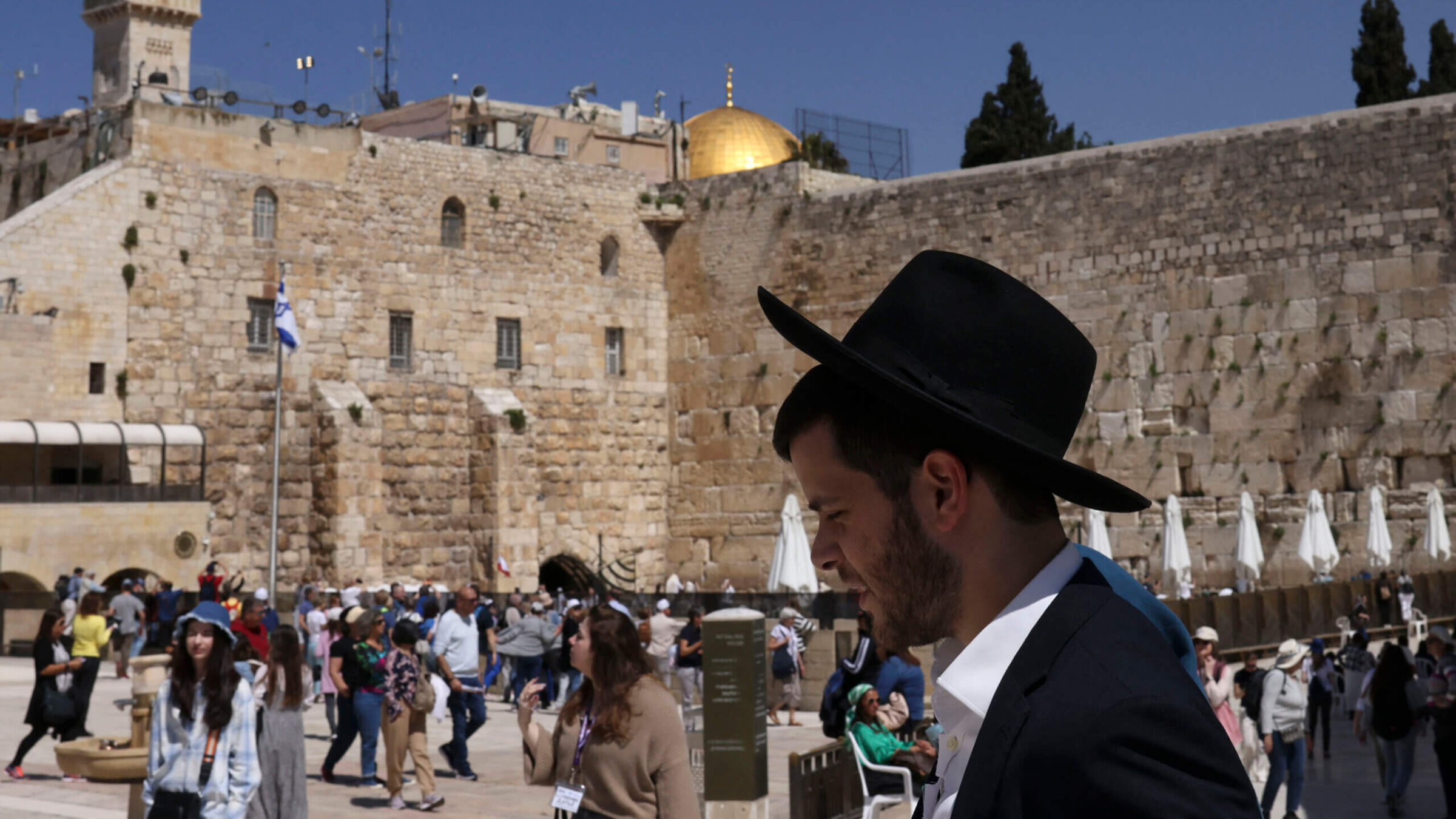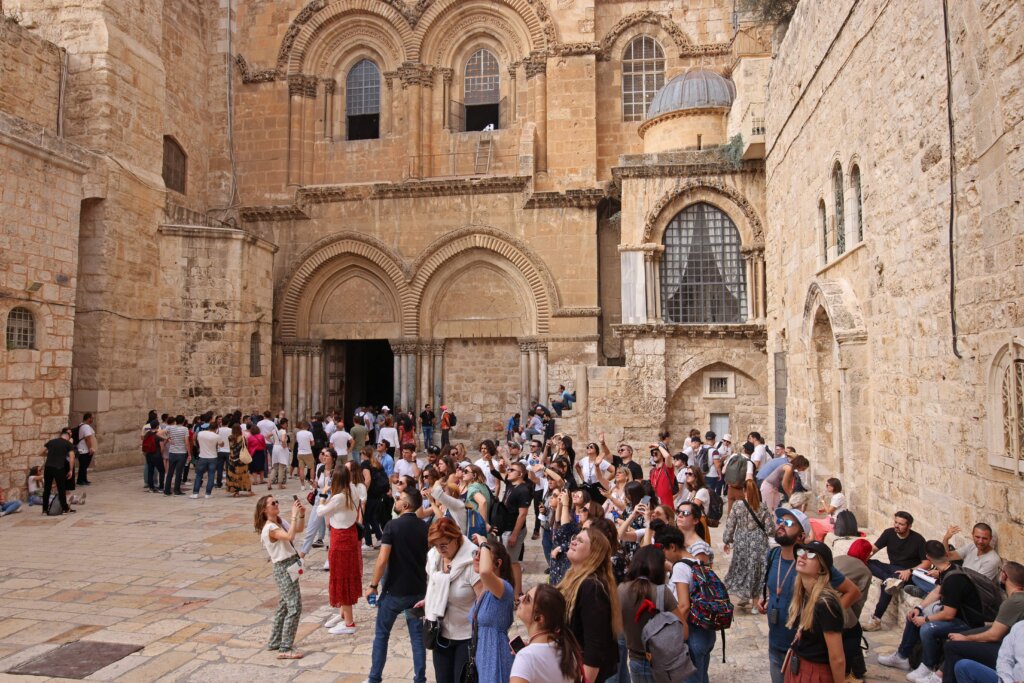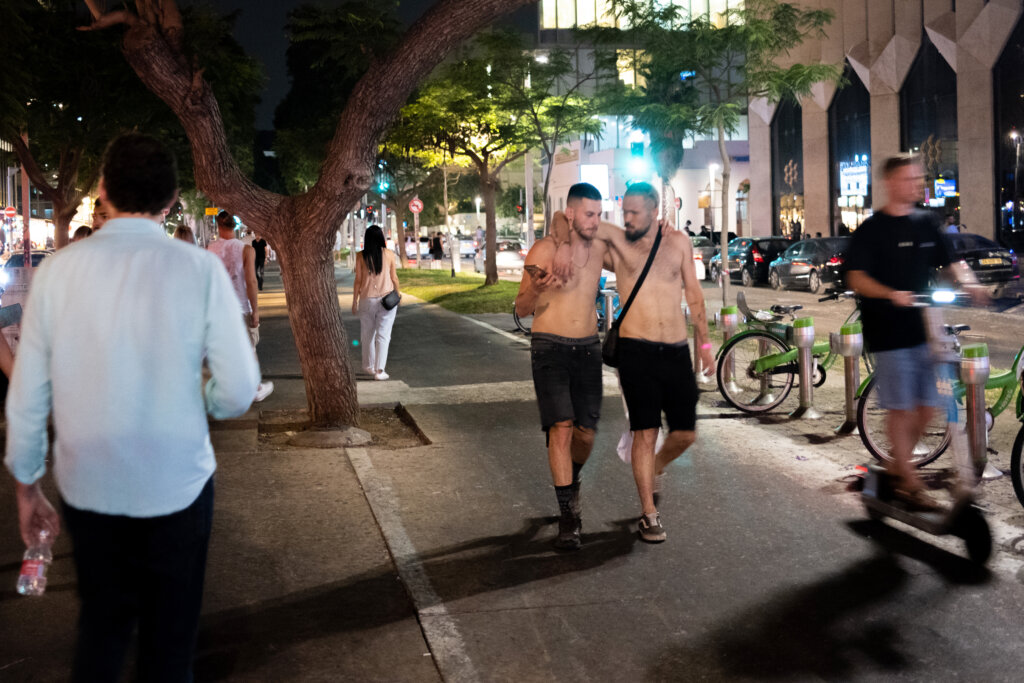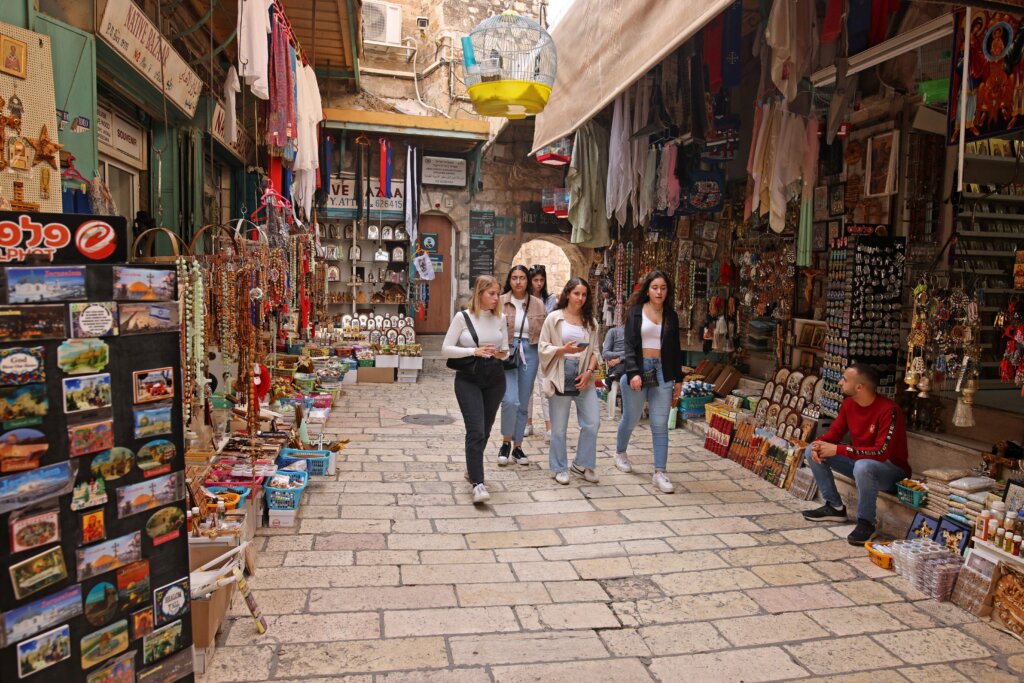Protests? What protests? Israel’s tourists enjoy nightlife and holy sites, uninterested in the country’s political strife
In Jerusalem and Tel Aviv, tourists continue to flock to holy sites, falafel stands and bars with little care for the mass demonstrations filling streets

The Western Wall is crowded with tourists and Israelis alike, all far more concerned with religion and prayer than politics. Courtesy of Hazem Bader/Getty Images
In my shared taxi from Ben-Gurion International Airport to Jerusalem (I arrived on a Saturday, so public transit was down), the driver, a middle-aged man, tried to point out some signs and protesters on a bridge over the road. There were protests every Shabbat against the government’s attempt to curb Israel’s Supreme Court’s power, he explained, and there would be a big demonstration in Jerusalem that night.
But his attempt to engage the 10 passengers fell flat; no one replied. Two, who had just met in the taxi, were busy flirting — somehow, a few minutes into the ride, she had already invited him to visit her in Dubai, and he’d invited her to Florida — one was asleep, and the rest were on their phones.
Every few days, international headlines carry stories about the massive demonstrations in Israel, where citizens have been protesting the government’s recent passage of a law limiting the Supreme Court’s power. There are pictures of thousands of upset citizens camping in parks, blocking highways and burning tires, as well as scenes of police riding horses into crowds or firing water cannons at protesters.
But in the streets of Jerusalem and Tel Aviv, tourists are undeterred. Sites like the Western Wall, the Church of the Holy Sepulchre and, of course, Tel Aviv’s nightlife-lined Rothschild Boulevard are still teeming with tourists from across the world. And the partiers and pilgrims are unconcerned with the protests raging just a few streets over.
In Jerusalem, I was staying in the Abraham Hostel, where I’d worked seven years ago when I lived in Jerusalem. There, I met Tom, a 2020 Bowdoin College graduate who now lives in Hawaii, at the free breakfast. When I sat down at the shared table, he was making plans with Malou, a German woman in loose pants with an Indian print who he’d just met, to go to Bethlehem that afternoon to visit the church built on the site where Jesus is said to have been born.

“You don’t really feel it,” Malou said of the protests, which she’d expected to see on Jerusalem’s main tourist thoroughfare, Jaffa Road, where the light rail runs. Tom, for his part, had passed a protest while he was in Tel Aviv earlier that week, but he didn’t know much about what was going on, although he asked me to recommend some articles he could read.
“I think I saw something on Instagram and decided not to dive in because it was four days before my trip and I didn’t want to freak myself out,” said Rebecca Rhodes, 33, a track and field coach at the University of Utah who was in Jerusalem to recruit athletes; I met her at a jazz concert on the hostel’s roof when she overheard me talking about the trip to my friend Itay. (I’d strategically invited Itay to meet me at the hostel because he’s a huge flirt, and I figured he’d find me some tourists to talk to; this proved correct.)
Rhodes said that she’d traveled in countries experiencing political upheaval before — once, while traveling in Chile, tear gas leaked in through her hotel window as police tried to quell a protest below — so she knew she could handle whatever was going on. She, too, asked me to briefly explain the protests, but soon the conversation wandered to more pressing topics: the best places to eat, and whether she would really float in the Dead Sea. (It’s true — in fact it’s so buoyant that it’s pretty hard to put your feet back down when you want to get out.)
The protests have also not deterred Birthright trips, whose participants are still flooding markets and sites across the country.
I met one group in their mid-20s in Tel Aviv in a beer bar on the roof of another hostel; the place was oddly devoid of tourists when I arrived, so I’d given up on my quest for tourists and instead engaged the bartender in a political discussion. But while we were deep in a breakdown of the politics of the Barbie movie, the Birthright group appeared, and the bartender pointed them out to me so I could chase them down.

It was the last night of their trip and they were ramping up for a big night out, drunk on both alcohol and love of Israel.
Though they said they hadn’t seen any protests, their trip’s guide, an Orthodox man, had explained the situation to them. Hadar Duskes, a gregarious blonde in a white crop top, and Jared Pattinson, a tall guy who invited me to stay and party with them, said the guide didn’t entirely agree with the “conservative side,” a largely religious government faction that wants to limit the courts’ power, so they felt that they’d gotten a well-rounded and unbiased understanding of the situation.
Their main take-home message about the protests dividing the country was one of unity — a stark contrast with Israelis who told me their country is becoming two separate nations.
Duskes, who has family in Israel and has visited often, summarized an anecdote their guide had told them: Two Israelis see each other on escalators, going opposite ways on their way to opposing protests; they high-five as they pass each other. “They’re still Israelis, and they put that first,” Duskes said. She said that she’d never felt so connected to the country before Birthright.
“As important as it is, it’s not what people came for at all,” Michael Even-Esh, who has worked as a guide in Israel for over 23 years, told me about the protests in a Facebook message. “And truthfully — except for a basic overview — it interests them very little.”
There are some exceptions to this. I met one tourist family outside the Church of the Holy Sepulchre in Jerusalem who said they attended two protests in Tel Aviv after deciding they were peaceful. And another tour guide, Karen Ben-Yehuda, who largely guides academic and political groups, told me via Facebook message that her groups were fascinated, and even sometimes wanted her to bring them to march in a demonstration.

But most travelers I accosted, looking for anyone who spoke English — my Hebrew is good but I don’t speak French or German or Russian — had little to say, or didn’t want to talk about politics when they were trying to visit a holy site.
As I wandered through Jerusalem’s Old City’s tourist-clogged alleys, a shopkeeper, Abed, hailed me to ask about the sun tattoo on my forearm. The 36-year-old Bedouin, who sells souvenirs such as embroidered pillow covers and quilts, invited me to talk with him over tea, where he engaged me in a lengthy discussion of polyamory. (He’d just broken up with his — monogamous — girlfriend and was very interested in the question of how to solve relationship boredom.)
When I managed to steer the discussion to how the protests had impacted tourism, Abed shrugged. He said he gets more worried calls from international friends when Syria is being bombed, and then has to explain that Damascus is in an entirely different country. “Americans are — sorry — not so intelligent,” he said. “They never know what’s going on outside.”




















